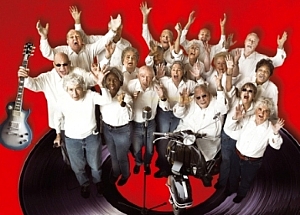
Before he became Il Duce, Benito Mussolini had an extra-marital affair that led to an illegitimate child. That is the concept behind Marco Bellocchio’s new film Vincere (Win). The film’s opening sequences are magnificent. Huge, operatic gestures, epic shots, everything pushed to an extreme. The year in 1914, and we see the young Mussolini run head-long through life, a volatile revolutionary spirit burning inside him.
Charistmatic, dashing, with a full head of hair and a moustache- it is clear why Ida Dalser (Giovanna Mezzogiorno) fell for him. Not just fell for him…from the very first time she sees him, she’s already given up her life for him. She exists to serve him. After spending little more than one night with him, she sells all of her belonging to help him start a newspaper. She is in love and on cloud nine. Once she tells him she’s pregnant however…it’s all over. Mussolini cuts all ties to her and the baby. This stuff is all fantastic melodrama. It is rife with beautiful imagery (particularly an inspired movie-theater fight between the Pacifists and war-mongers), a magnificent score, the beauty of Ms. Mezzorogiorno and the charisma of Filippo Timi as Mussolini. However, the film shifts gears after a while, and loses a whole lot of steam. In fact, it grinds to a halt, and only fleetingly works up the same kind of energy of the early scenes.
There is one obvious reason for it grinding to a halt. The film changes its lead character. After Mussolini disowns Ida and her child, she disappears, and we follow him around for a while. She appears, but only as a thorn in his shoe, yelling at him for abandoning them. This is obviously the story of how he lives with what he’s done (he seems fine with it). But then, the story shifts back to Ida, as she is sent to live in the country in order to keep her away from Mussolini, and the character of Mussolini vanishes from the movie, only to be shown in actual newsreels with the familiar rock-hard, hairless visage we all know. I grew increasingly tired with Ida’s presence. She is simply a sad, wronged woman. All she wants is Mussolini, and to be remembered as the mother of his child. There’s no growth, no development…she just gets sadder and more desperate. I grew bored of this character very quickly. Even when she’s thrown into a mental institution to silence her, she’s still the same annoyingly vapid woman- all she wants is Mussolini. But the climactic anti-climax of this movie came for me when her son is introduced as a grown man. He is played by none other than Filippo Timi, the same actor who played the elder Mussolini. His presence reminded me precisely of how uninteresting Ms. Mezzorogiorno’s part was, in addition to adding a weird oedipal subtext that just felt out of place. Even so, the second did also have its own visual flourishes, and the score throughout is one of the best film scores I’ve heard in a while. I just wish that this (alleged) minor footnote in Italian history wasn’t put up against the people and events we all know so well- it simply is not interesting enough.
Director Stephen Walker’s film Young at Heart (also known as Young@Heart) is a very difficult film to review. It is one of the most wonderful documentaries I’ve seen. It’s not formally interesting; the filmmaking is as bare-bones and uninteresting as it gets. It is wonderful purely for its subject: The Young at Heart chorus, made up entirely of senior citizens, whose repertoire ranges from classic rock to punk to contemporary pop. The story and the people we are introduced to bring to mind so many clichés of movie poster one-liner, yet they would all fit…I can’t recall the last film I saw that was as immune to cynicism as this one. The members of this choir are so lovable and relatable that even the sense that they are putting on a show for the cameras doesn’t lessen the impact of their words- it is simply another aspect of the vitality the film is filled with. I can’t even say what ideas the film inspires- they’d be so simple and condescending to all of the people on display here. I absolutely adored this film, had a huge smile on my face for almost all of it, will be recommending it to everyone I know, and I felt like the world was a better place for this story to be in existence. See it. I’ll eat my hat if you’re sorry afterwards.
The documentary Harlan: In the Shadow of the Jew Suss touches on a subject that I’ve been thinking a lot about recently. It is a film that in a major way is about German guilt over the Holocaust. Recently seeing Wim Wenders much-admired Wings of Desire, I was struck by how casually Wenders touched on this subject, and how little credence he gave to it. It angered me, but interested me in equal measure, how a people deal with the horrifying acts of their country and their ancestors. This new documentary touches on the subject not on a national level, but a very direct personal level. Veit Harlan was one of the premiere filmmakers working for the Nazi regime during WWII. He directed a number of nationalistic melodramas, and had unlimited funds to create epics to stir the German people into action against Germany’s enemies. The most infamous of his films is called The Jew Suss, a work commissioned by the propaganda ministry to fan the flames of anti-Semitism, containing all of the most negative stereotypes associated with Judaism. Harlan’s success in this endeavor made him one of the only artists to be put on trial for war-crimes, for which he was acquitted, saying he was coerced into making the film. The documentary contains interviews with several of his descendants, as well as generous and shocking clips from his films. Though it is a bit formless, it is fascinating in how it shows all the different reactions that his descendants have to Harlan’s legacy. His three sons (from two different marriages) each react differently to the questions about their father’s complicity. The grandchildren are more removed, naturally, but they also are interesting in the varying degrees of connection they seem to feel with their grandfather.
Although essentially a series of talking heads, this film really gave me some valuable insight into the German perception of their past, and helped -if only a little- in lessening the stigma I have in relation to all things German.
p.s. although their point of views are more distant than that of Veit’s descendants, among the interviewees are Jan and Christiane, Harlan’s niece and nephew. This is interesting because Christiane married none other than Stanley Kubrick (who was Jewish), and Jan was a close associate of Kubrick’s, producing several of his films.
Screening times:
Vincere
17.7 at 10:30
Young@Heart
14.7 at 18:15
Harlan – In the Shadow of the Jew Suss
17.7 at 14:15, 18.7 at 15:45
SHLOMO PORATH





